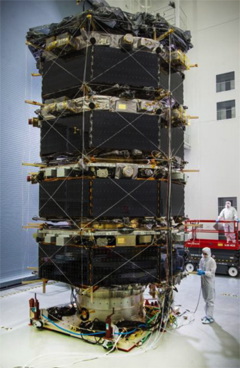DUNMORE Materials Protect MMS Spacecraft
- Published: March 31, 2015
BRISTOL, PA | DUNMORE Corporation reports that, following the recent successful launch of NASA's Magnetospheric Multiscale (MMS) mission, the company’s insulating products are protecting MMS' four identical spacecraft as they settle into orbit to study a poorly understood phenomenon known as magnetic reconnection. 
The company supplied the film-based multilayer insulation materials that are now in use thermally protecting electronic instruments and other components on all four MMS spacecraft. The mission was launched from Cape Canaveral, FL, atop an Atlas V-421 launch vehicle on March 12, 2015. Its four spacecraft are now flying in formation in an elliptical orbit around Earth to study how magnetic fields connect and disconnect, explosively releasing energy that can accelerate particles to nearly the speed of light—a process known as magnetic reconnection.
The mission gives scientists, for the first time, a view of the magnetic reconnection phenomenon as it is happening. Ultimately, it will lead to a better understanding of how this fundamental process works on the sun on other stars and throughout the universe. It will also shed light on giant geomagnetic storms such as the "Halloween storms" that affect communications, aircraft safety, and even the electrical power grid.
DUNMORE, now in its 45th year, is an ISO-certified manufacturer of coated, laminated, and metallized films with two manufacturing locations, one in the US and one in Europe. As a key sub-contractor on the MMS mission, the company provided film-based insulating materials to protect mission components and delicate electronics.
The films are sewn together, cut into complex shapes, and sealed with matching polyimide tapes. The resulting Thermal Protection System (TPS) then covers every instrument and component of the spacecraft structure. Since 1984, these manufactured materials reportedly have provided thermal protection against average temperature ranges of –150 deg C to +150 deg C as well as shield against micrometeoroids and space debris and the corrosive effects of atomic oxygen.
This email address is being protected from spambots. You need JavaScript enabled to view it.




